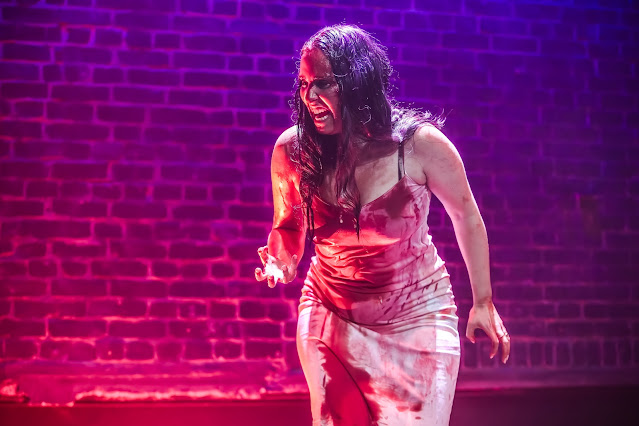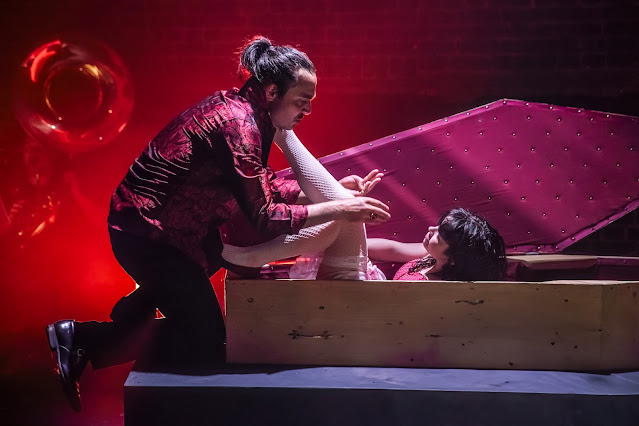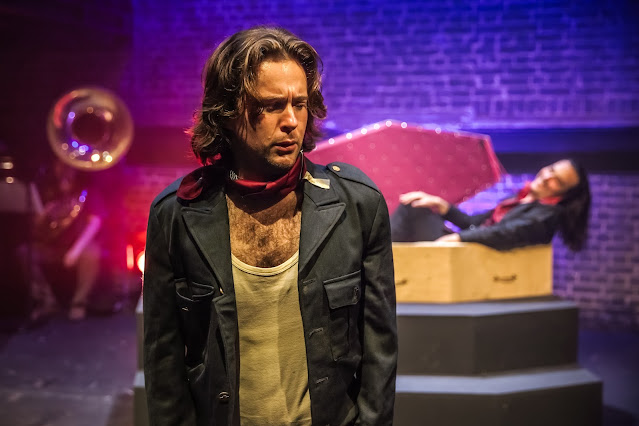 |
| Marschner: Der Vampyr – Milena Knauß – Gothic Opera (Photo: Craig Fuller) |
Marschner: Der Vampyr, in a version by Julia Mintzer & Kelly Lovelady; Giuseppe Pellingra, Milena Knauß, Jack Roberts, Amber Reeves, Conall O’Neill, Madeleine Todd, Matthew Scott Clark, Gráinne Gillis, director: Julia Mintzer, conductor: Kelly Lovelady, Gothic Opera; Grimeborn Festival at the Arcola Theatre
14 August 2024
A brave revival of the important German Romantic opera, reinvented as a Vampire romp, performed with a gusto that rather lost the subtleties of Marschner’s score.
A younger contemporary of Weber, Heinrich Marschner wrote operas in the same vein of German Romanticism, with its fascination with supernatural, exploring heightened emotions and the dramatic possibilities that the orchestra and an increased used of reminiscence motifs offered. Marschner’s leading male characters are often flawed individuals, Don Giovanni-like, psychologically complex and his operas had an important influence on Wagner. However, they have their limitations, these composers and their librettists were developing a new German opera and the tradition lacked the depth of experience that Italian librettists could draw on. And from a modern stand-point, heroines tend to be passive and lack any sort of agency.
Marschner’s 1827 opera, Der Vampyr remains on the very fringes of the repertoire, partly because its libretto (by Marschner’s brother-in-law) is ultimately based on John Polidori’s 1819 short story, The Vampyre. But in English-speaking countries, productions of the opera remain rare. I am not sure when it last received a large-scale production in the UK, and its last significant outing was on TV in 1992 as a TV soap-opera! But then, this reflects the general lack of interest in pre-Wagnerian German Romantic opera, as much tends to me made of its dramaturgical limitations.
Gothic Opera was founded with a production of Marschner’s Der Vampyr in 2019, and director Julia Mintzer and music director Kelly Lovelady returned to the opera, revisiting that adaptation. The production opened at Arcola Theatre‘s Grimeborn Festival on Wednesday 14 August 2024. Giuseppe Pellingra as Ruthven, Milena Knauß as Malwina, Jack Roberts as Aubrey, Amber Reeves as Emmy, Conall O’Neill as Davenaut, Madeleine Todd as Janthe, Matthew Scott Clark as Georg and Gráinne Gillis as Vampire Master. Designs were by Charles Ogilvie.
 |
| Marschner: Der Vampyr – Giuseppe Pellingra, Amber Reeves – Gothic Opera (Photo: Craig Fuller) |
The opera was sung in German, but with new English dialogue by Julia Mintzer and the production was best understood as being after Marschner, as Mintzer and Lovelady created a rather irreverent romp inspired by more modern vampire films, the production leaned into humour rather a lot and the finale veered between schock-horror and Monty Python. Somewhere along the line, Marschner’s brand of German romanticism got well and truly lost.
It didn’t help that the instrumental ensemble consisted of Niki Moosavi, cello, Adam Storey, double bass, Iain McDonald, sousaphone, Jasmin Allpress, piano / harmonium, so that all the instrumental detail of the score was restricted to the piano, whole passages went for naught, and the impact of Marschner’s important use of melodrama to heighten speech was almost absent as the melodrama was reduced to the distant tinkling of the piano, whilst the important passage, late in the opera, when the light of the moon revives the vampire was almost entirely absent. Also, the way recitative, melodrama and dialogue interweaved meant that there were some passages where singers inserted some English into the German, and you felt the whole opera would have benefitted from being done in English.
The production successfully reinvented Giuseppe Pellingra’s Ruthven as a semi-comic villain figure. He lacked any element of complexity and we were never in doubt about him. You felt that Giuseppe Pellingra was capable of performing with more depth than he was allowed here, but he more than held the attention as the swaggering villain. The audience happily laughed at Pellingra’s Ruthven, though I feel Marschner and his librettist wanted us to be both attracted to and disturbed by him, and Polidori’s original character has links to Lord Byron. In the opera, the character’s name was pronounced ‘Ruth-ven’, but the original Scottish title is pronounced ‘Rivven’.
As his first two victims, Amber Reeves Emmy and Madeleine Todd’s Janthe remained just that, rather passive victims who seemed almost delighted to be turned, and both Reeves and Todd played their roles with relish.
There were problems of tone, however with the story of Malwina and Aubrey (Milena Knauß and Jack Roberts), this is a classic German Romantic liaison and Emmy is meant to represent an element of spiritual purity to contrast to Ruthven’s dark side. Malwina’s big Act Two aria was done straight, and admirably sung by Milena Knauß, but it rather stood out from the general comic tone, as did Roberts’ dramatic interventions as ‘hero’ Aubrey, which were more often than not played for a laugh.
Conall O’Neill as Davenaut and Matthew Scott Clark as Georg provided fine support but the productions lack of interest in background detail meant that it wasn’t really clear who these people were. This reflected a larger problem in that Mintzer’s English script rather rattled along at pace and details, such as Aubrey’s vow to Ruthven near the beginning, got a bit lost. Gráinne Gillis sang the Vampire Master with wonderful relish, really making the character sing.
Marschner’s vocal lines are not easy, there is a complex elaboration to the vocal writing with plenty of taxing moments. Most of the singers were more than capable, and though Amber Reeves took time to warm into the role, her big Act Two number was finely done. All the singers would have benefitted from greater instrumental support, fleshing out Marschner’s orchestra detail.
 |
| Marschner: Der Vampyr – Jack Roberts, Giuseppe Pellingra – Gothic Opera (Photo: Craig Fuller) |
The production used the full studio space effectively, it this meant that any action happening at the back of the stage was not visible from the side seats, and the surtitle visibility was at a premium too.
If you accepted that we were not going to get a German Romantic opera but more of a comic romp, then this was a good evening, but even then, I had rather wished they had leaned into an atmosphere based on Nosferatu rather than Buffy, the Vampire Slayer.
Never miss out on future posts by following us
The blog is free, but I’d be delighted if you were to show your appreciation by buying me a coffee.
Elsewhere on this blog
- Substantial and satisfying listening: Stuart Hancock’s score for the new film, Kensuke’s Kingdom – record review
- White-hot dramatic impetus: Meyerbeer’s Le prophète on LSO Live uses a traditional version but captures the work’s essential drama – record review
- Songs from two golden ages: Nicholas Mulroy, Elizabeth Kenny & Toby Carr in a recital of effortless beauty – record review
- Everything is connected: Barbican Quartet on their debut album, Manifesto on Love, on Genuin label – interview
- Vivacity, humour & pathos: Opera Holland Park & Charles Court Opera in Gilbert & Sullivan’s The Yeomen of the Guard – opera review
- Prom 24: Vividness & virtuosity in an astonishing danced staging of Purcell’s The Fairy Queen – opera review
- Prom 23: riveting symphonic theatre from Benjamin Grosvenor, Edward Gardner & LPO in Busoni’s Piano Concerto – concert review
- The encounter that never was: composers Alex Ho and Sun Keting on their collaboration on a new music theatre work interweaving the stories of two very different Chinese women – interview
- More than entertainment: Oliver Webber and the Monteverdi String Band’s The Madrigal Reimagined – record review
- Confidence, style and engagement: Rossini’s The Barber of Seville at West Green House Opera is a complete delight – opera review
- An eclectic mix: Brixton Chamber Orchestra at Clapham Park Cube – review
- Home









